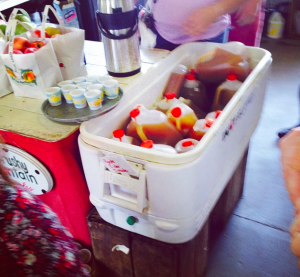 A couple weeks ago I took my kids to the farmers’ market. Sam, who is 3, is all about food shopping: picking out what the family will be eating while trying to convince me to buy him treats and snacking on the free samples. While Jack and Dani were looking at plants for our gardens, Sam and I toured the food stalls. We came upon a vendor selling cider (right, exactly as shown).
A couple weeks ago I took my kids to the farmers’ market. Sam, who is 3, is all about food shopping: picking out what the family will be eating while trying to convince me to buy him treats and snacking on the free samples. While Jack and Dani were looking at plants for our gardens, Sam and I toured the food stalls. We came upon a vendor selling cider (right, exactly as shown).
Worrying more about my kids safety than looking like a nerd, I asked, “Is it pasteurized?”
The dude at the stall answered, “It sure is, flash pasteurized to keep it safe.”
Winner.
My friend Judy Harrison writes in this month’s Food Safety Magazine that farmers’ markets continue to increase as a place for folks to connect with their food.
Visiting with your neighbors, listening to live music while shopping, meeting the farmer who grew the produce, sampling the fresh food in the market, the festival-like atmosphere…that is the downhome feel that has Americans flocking to farmers markets.
Who are the customers shopping at these markets? It takes only a trip on an early Saturday morning to see that many of the customers are senior adults, people who may have health problems and mothers with young children all shopping for foods they perceive to be healthier and safer than those you buy in the grocery store. What is often casually observed is an attitude, not just among consumers but among farmers and market managers as well, that “It’s locally grown…I know that farmer…It’s organic…so it is healthier and safer than what I could get at the store.”
If you took a tour of your local farmers market, what would you see? Many local markets are held in open fields in city parks or even in parking lots. Conditions may be less than sanitary. You are likely to observe fruits and vegetables displayed on the ground rather than being held at least six inches above this surface, as would be required in food storage areas of restaurants or grocery stores. You are also likely to encounter customers or even vendors bringing their dogs into the market area and having access to displays. You may or may not see handwashing facilities or at least hand sanitizer being provided in the market. Some of the produce may already be packaged in open bags for customers to pick up, or customers may be allowed to handle and select their own produce. You may even see stations where customers can bring produce they have just purchased to be juiced or blended into healthy shakes—with no evidence of facilities for washing produce, hands or equipment. You may see displays where customers can sample cut produce that is not being kept on ice or refrigerated. You may also see entrepreneurs who are making and selling food products that you hope are at least following cottage food regulations. As a food safety professional, you see opportunities for increased risk of foodborne illness.
Judy’s comments are bang-on, lots of people shop at the farmers market, have various perceptions and may not see the world through the eyes of a food microbiologist. The conversation I had with the cider vendor led me to revisit a project idea we’ve had steeping for a while: what questions do I ask at the farmers’ market – and what do I think the answers should be? Stuff like what does the producer do to evaluate the safety of the water they use, do they use composted manure, how do they handle ill staff who show up to pick?
I have linked a draft of a document that captures those questions and more and I’m asking the online food safety nerds to share additional thoughts and questions to make the document more robust. Feel free to add a comment here on the blog, tweet @benjaminchapman, post a comment on our Facebook page or use old fashioned e-mail.



